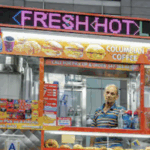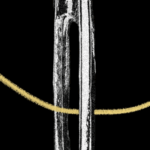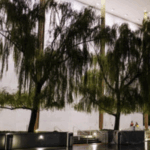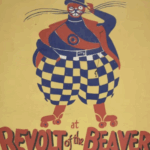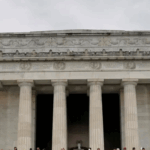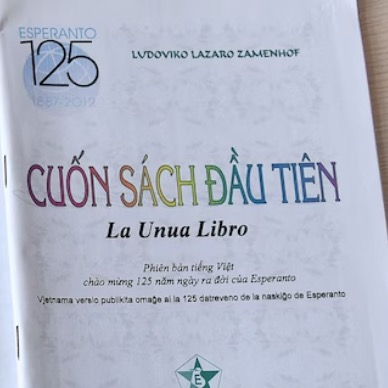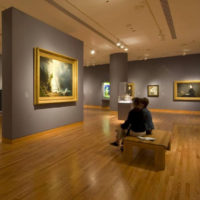AJ Four Ways: Text Only (by date) | headlines only
DANCE
IDEAS
- Netflix’s Big Time Bet On Streaming Live Sports

The stakes are high. WrestleMania, which began in 1985, is being treated as a litmus test – not just for WWE’s global expansion, but for Netflix’s potential move into live sports. – BBC
- What Happens To Our Culture When Hobbies Get Too Expensive

Hobby inflation, understood in this light, is about much more than price hikes: It’s about the shrinking and possible disappearance of opportunities for people from different backgrounds to get to know one another. – The Atlantic
- Coming To Terms With Richard Serra

Over the past half century the art history industry has produced reams of interpretation, incorporating no shortage of words by Serra himself. The author of work so totally laconic has set the terms of its understanding as if the death of the author bypassed him entirely. – N + One
- How “Blockbusters” Degraded Hollywood’s Soul

I think Hollywood used to propose itself as a place where artists and creative people could sustain themselves, perhaps even strike it rich, and that’s gone. The loss of that idea is … incalculable. – Los Angeles Times
- A Mathematical Model To Better Understand Language?

By thinking of language as a mathematical category, Tai-Danae Bradley‘s been able to apply established tools to study it and glean new insights. Linguists hope her model can help them to prove certain theories about how grammar and meaning emerge from strings of words, and to identify how AI-generated text differs from human language. – Quanta
ISSUES
- Coming To Terms With Richard Serra

Over the past half century the art history industry has produced reams of interpretation, incorporating no shortage of words by Serra himself. The author of work so totally laconic has set the terms of its understanding as if the death of the author bypassed him entirely. – N + One
- Van Gogh’s Final Painting Is Causing Trouble In This Idyllic French Village
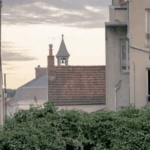
“The continued fight over Van Gogh’s tree roots has cast a pall over what is usually a celebratory season in Auvers, population 7,000, where art tourism is a big business that heats up in the spring.” – The New York Times
- The US Knew It Needed Public Housing, But The People Building It Often Didn’t Like It
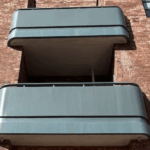
Despite the decades of neglect, when a new “Chicago museum’s leadership was pursuing oral histories of public housing, they found other narratives as well — of community, empowerment and self-sufficiency.” – Washington Post (MSN)
- Should Gaudi Be Seen As A Saint?

Even if you’re not a believer, the answer is probably a yes. “Gaudí’s mission was to find spiritual meaning in a world transformed by industry and machines.” – The Observer (UK)
- Medieval Monks Did What?

In the Ireland of a thousand years ago, monks fleeing the Vikings spread their beautifully decorated version of Christianity to Europe. Some of those manuscripts survived an intensely brutal, violent millennium. – The Guardian (UK)
MEDIA
- So What Comes After DEI?
Conservatives have painted D.E.I. as a uniform set of programs, ideas, and ideologies. In reality, the term encompasses a wide-ranging set of practices. Still, D.E.I. spaces often share certain analytic frameworks, usually centering on questions of justice. – The New Yorker
- Why New York’s Parking Lots Are Stuffed To The Brim And Beyond
It’s the food trucks. Their owners or renters are gone, or in hiding, never opening their doors. In this version of the Big Apple, “the usual recourse to a quick, tasty and cheap snack is now an endangered option.” – El País
- An Updated Timeline Of The Harvey Weinstein Trials
As jury selection begins in the newest trial, here’s a timeline of all of the trials and appeals so far. – NPR
- When Hobbies Like Knitting And Fishing Become Too Expensive, We All Lose
When hobby inflation takes over, we lose community across all kinds of lines: “Hobbies can produce communities where, because the hobby itself takes top priority, the participants’ social or cultural differences become less important.” – The Atlantic
- More Cuts Hobble The Kennedy Center In A Variety Of Departments
Marketing, campus planning, and the entire social media team – gone as of Friday. “Kennedy Center staff members … spoke on the condition of anonymity for fear of retribution. Most former employees had to sign non-disparagement agreements.” – Washington Post (MSN)
MUSIC
- A Mathematical Model To Better Understand Language?
By thinking of language as a mathematical category, Tai-Danae Bradley‘s been able to apply established tools to study it and glean new insights. Linguists hope her model can help them to prove certain theories about how grammar and meaning emerge from strings of words, and to identify how AI-generated text differs from human language. – Quanta
- Study Literature? What It Means
As the English degree craters, and the idea of the university itself is under assault in the United States and elsewhere, those of us who remain interested in literate culture are sensing in its decline some correlation with the current apoplexy, if not direct causation. – 3 Quarks Daily
- Books Have “No Economic Value” Claims Meta
Meta cited an expert witness who downplayed the books’ individual importance, averring that a single book adjusted its LLM’s performance “by less than 0.06 percent on industry standard benchmarks, a meaningless change no different from noise.” Thus there’s no market in paying authors to use their copyrighted works, Meta says. – Futurism
- British Authors Protest Zuckerberg’s Taking Of Their Books For Generative AI
“Earlier this month, a group of protesters gathered outside the London headquarters of Meta, the parent company of Facebook, Instagram and WhatsApp. They were demonstrating over the company’s use of millions of pirated books and research papers to feed their family of generative AI models.” – The Guardian (UK)
- The Naval Academy Was Supposed To Host A Lecture On Idea Censorship And Reading Fearlessly
Then the Academy, apparently not fearless, censored the lecture. “I did not want to cause them trouble. I did, however, feel it was essential to make the point that the pursuit of wisdom is impossible without engaging with (and challenging) uncomfortable ideas.” – The New York Times
PEOPLE
- Netflix’s Big Time Bet On Streaming Live Sports
The stakes are high. WrestleMania, which began in 1985, is being treated as a litmus test – not just for WWE’s global expansion, but for Netflix’s potential move into live sports. – BBC
- What Happens To Our Culture When Hobbies Get Too Expensive
Hobby inflation, understood in this light, is about much more than price hikes: It’s about the shrinking and possible disappearance of opportunities for people from different backgrounds to get to know one another. – The Atlantic
- Coming To Terms With Richard Serra
Over the past half century the art history industry has produced reams of interpretation, incorporating no shortage of words by Serra himself. The author of work so totally laconic has set the terms of its understanding as if the death of the author bypassed him entirely. – N + One
- How “Blockbusters” Degraded Hollywood’s Soul
I think Hollywood used to propose itself as a place where artists and creative people could sustain themselves, perhaps even strike it rich, and that’s gone. The loss of that idea is … incalculable. – Los Angeles Times
- A Mathematical Model To Better Understand Language?
By thinking of language as a mathematical category, Tai-Danae Bradley‘s been able to apply established tools to study it and glean new insights. Linguists hope her model can help them to prove certain theories about how grammar and meaning emerge from strings of words, and to identify how AI-generated text differs from human language. – Quanta
PEOPLE
- Netflix’s Big Time Bet On Streaming Live Sports
The stakes are high. WrestleMania, which began in 1985, is being treated as a litmus test – not just for WWE’s global expansion, but for Netflix’s potential move into live sports. – BBC
- What Happens To Our Culture When Hobbies Get Too Expensive
Hobby inflation, understood in this light, is about much more than price hikes: It’s about the shrinking and possible disappearance of opportunities for people from different backgrounds to get to know one another. – The Atlantic
- Coming To Terms With Richard Serra
Over the past half century the art history industry has produced reams of interpretation, incorporating no shortage of words by Serra himself. The author of work so totally laconic has set the terms of its understanding as if the death of the author bypassed him entirely. – N + One
- How “Blockbusters” Degraded Hollywood’s Soul
I think Hollywood used to propose itself as a place where artists and creative people could sustain themselves, perhaps even strike it rich, and that’s gone. The loss of that idea is … incalculable. – Los Angeles Times
- A Mathematical Model To Better Understand Language?
By thinking of language as a mathematical category, Tai-Danae Bradley‘s been able to apply established tools to study it and glean new insights. Linguists hope her model can help them to prove certain theories about how grammar and meaning emerge from strings of words, and to identify how AI-generated text differs from human language. – Quanta
THEATRE
VISUAL
- What Happens To Our Culture When Hobbies Get Too Expensive
Hobby inflation, understood in this light, is about much more than price hikes: It’s about the shrinking and possible disappearance of opportunities for people from different backgrounds to get to know one another. – The Atlantic
- Artists In The United States Survived A Rabidly Anti-Art Government Before
And here’s how to do it again. – The Conversation
- How Trump And His People Want To Capture The History Of The United States
“The president has gone beyond rhetoric, moving to challenge or seize control of history-related federal cultural institutions including the Smithsonian, the National Park Service and the National Endowment for the Humanities.” – The New York Times
- When An AI Chatbot Simply Makes Up A Company Policy, Things Can Go Very Wrong
This seems fine: “Instead of admitting uncertainty, AI models often prioritize creating plausible, confident responses, even when that means manufacturing information from scratch.” – Wired
- Can Architecture, And Urban Planning, Help Older People Age In Safer Neighborhoods?
“Cities are often defined by spatial ageism where environments are not set up for older people. The age-friendly movement aims to ensure older people can still play a part in civic life.” – The Guardian (UK)

